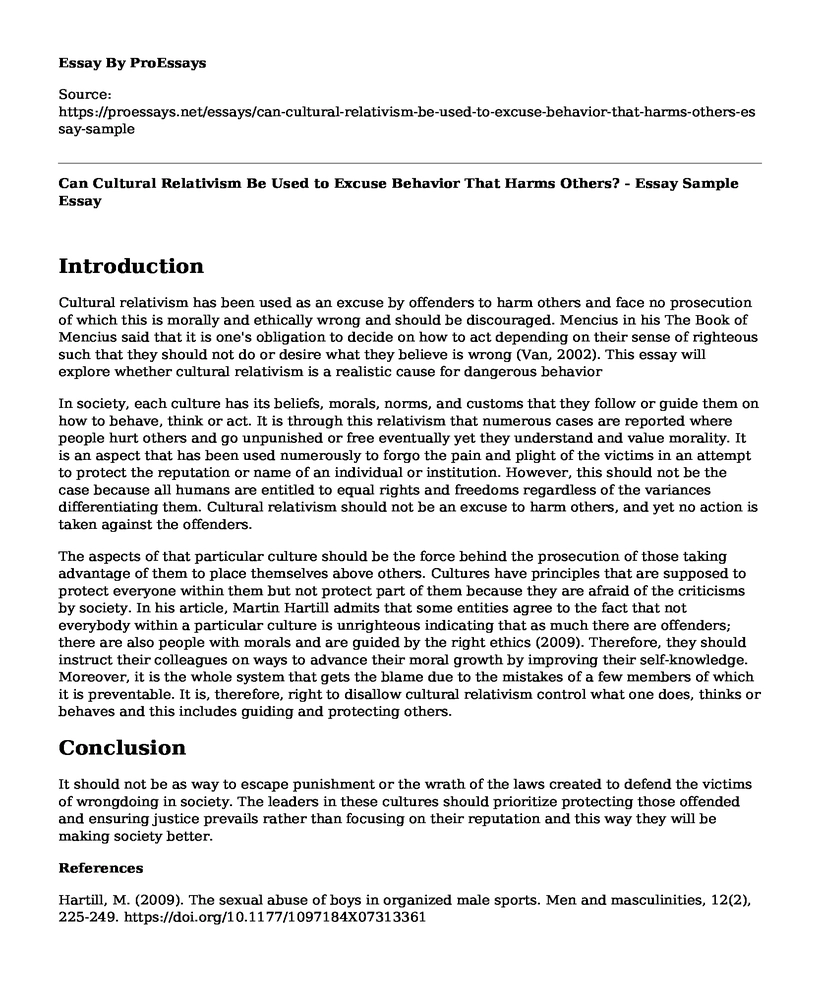Introduction
Cultural relativism has been used as an excuse by offenders to harm others and face no prosecution of which this is morally and ethically wrong and should be discouraged. Mencius in his The Book of Mencius said that it is one's obligation to decide on how to act depending on their sense of righteous such that they should not do or desire what they believe is wrong (Van, 2002). This essay will explore whether cultural relativism is a realistic cause for dangerous behavior
In society, each culture has its beliefs, morals, norms, and customs that they follow or guide them on how to behave, think or act. It is through this relativism that numerous cases are reported where people hurt others and go unpunished or free eventually yet they understand and value morality. It is an aspect that has been used numerously to forgo the pain and plight of the victims in an attempt to protect the reputation or name of an individual or institution. However, this should not be the case because all humans are entitled to equal rights and freedoms regardless of the variances differentiating them. Cultural relativism should not be an excuse to harm others, and yet no action is taken against the offenders.
The aspects of that particular culture should be the force behind the prosecution of those taking advantage of them to place themselves above others. Cultures have principles that are supposed to protect everyone within them but not protect part of them because they are afraid of the criticisms by society. In his article, Martin Hartill admits that some entities agree to the fact that not everybody within a particular culture is unrighteous indicating that as much there are offenders; there are also people with morals and are guided by the right ethics (2009). Therefore, they should instruct their colleagues on ways to advance their moral growth by improving their self-knowledge. Moreover, it is the whole system that gets the blame due to the mistakes of a few members of which it is preventable. It is, therefore, right to disallow cultural relativism control what one does, thinks or behaves and this includes guiding and protecting others.
Conclusion
It should not be as way to escape punishment or the wrath of the laws created to defend the victims of wrongdoing in society. The leaders in these cultures should prioritize protecting those offended and ensuring justice prevails rather than focusing on their reputation and this way they will be making society better.
References
Hartill, M. (2009). The sexual abuse of boys in organized male sports. Men and masculinities, 12(2), 225-249. https://doi.org/10.1177/1097184X07313361
Radiate & Reflect Productions (2011, 7 Dec) [online]. Coached into Silence: Protecting Institutions, Sacrificing Children https://www.youtube.com/watch?v=rqg2cZz18RQ&feature=youtu.be
Van Norden, B. W. (2002). The emotion of shame and the virtue of righteousness in Mencius. Dao, 2(1), 45-77.Retrieved from https://page-one.springer.com/pdf/preview/10.1007/BF02856995
Cite this page
Can Cultural Relativism Be Used to Excuse Behavior That Harms Others? - Essay Sample. (2022, Dec 12). Retrieved from https://proessays.net/essays/can-cultural-relativism-be-used-to-excuse-behavior-that-harms-others-essay-sample
If you are the original author of this essay and no longer wish to have it published on the ProEssays website, please click below to request its removal:
- My Literacy Narrative: My Childhood
- Basic View of Human Nature
- Aristotle Highest Good Essay Example
- Essay Example on Free to Explore: Different Perspectives on Freedom
- Critical Theory: Understanding Social Life and Its Structures - Research Paper
- Essay Example on Youth Crime: An Unsolvable Problem?
- Free Report Example on Men's Fertility & Fatherhood







